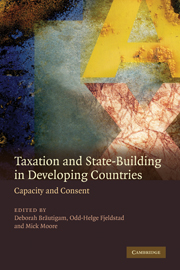Book contents
- Frontmatter
- Contents
- List of figures and tables
- List of contributors
- Acknowledgements
- 1 Introduction: taxation and state-building in developing countries
- 2 Between coercion and contract: competing narratives on taxation and governance
- 3 Capacity, consent and tax collection in post-communist states
- 4 Taxation and coercion in rural China
- 5 Mass taxation and state–society relations in East Africa
- 6 Contingent capacity: export taxation and state-building in Mauritius
- 7 Tax bargaining and nitrate exports: Chile 1880–1930
- 8 Associational taxation: a pathway into the informal sector?
- 9 Rethinking institutional capacity and tax regimes: the case of the Sino-Foreign Salt Inspectorate in Republican China
- 10 Tax reform and state-building in a globalised world
- References
- Index
7 - Tax bargaining and nitrate exports: Chile 1880–1930
Published online by Cambridge University Press: 22 September 2009
- Frontmatter
- Contents
- List of figures and tables
- List of contributors
- Acknowledgements
- 1 Introduction: taxation and state-building in developing countries
- 2 Between coercion and contract: competing narratives on taxation and governance
- 3 Capacity, consent and tax collection in post-communist states
- 4 Taxation and coercion in rural China
- 5 Mass taxation and state–society relations in East Africa
- 6 Contingent capacity: export taxation and state-building in Mauritius
- 7 Tax bargaining and nitrate exports: Chile 1880–1930
- 8 Associational taxation: a pathway into the informal sector?
- 9 Rethinking institutional capacity and tax regimes: the case of the Sino-Foreign Salt Inspectorate in Republican China
- 10 Tax reform and state-building in a globalised world
- References
- Index
Summary
Introduction
Taxation can be a powerful mechanism generating consultation and bargaining between the state and the owners of assets. Under what conditions is bargaining likely to prevail over its opposite – unilateral extraction by the state? Margaret Levi argues that rulers will maximise revenue subject (in part) to the constraints of their bargaining power relative to those who are being taxed. She defines bargaining power as ‘the degree of control over coercive, economic and political resources’ (Levi 1988: 2). Bargaining is clearly more likely when there is a balance of power between state actors and taxed groups. However, this is not the whole story. Using a case study of the nitrate in Chile between 1880 and 1930, this chapter focuses on the determinants of bargaining in the taxation of exports in a natural resource economy. I identify the main factors that explain when taxation is likely to lead to either bargaining and consultation or the unilateral imposition of taxes by the state. The chapter contributes to the broader project of this volume: understanding the impact of taxation on the development of political institutions in developing countries. More specifically, it contributes to the bargaining model of taxation, particularly to Levi's work, by exploring the impact of a factor that affects many developing countries: the instability of the world market of natural resource exports.
- Type
- Chapter
- Information
- Taxation and State-Building in Developing CountriesCapacity and Consent, pp. 160 - 182Publisher: Cambridge University PressPrint publication year: 2008
- 3
- Cited by



